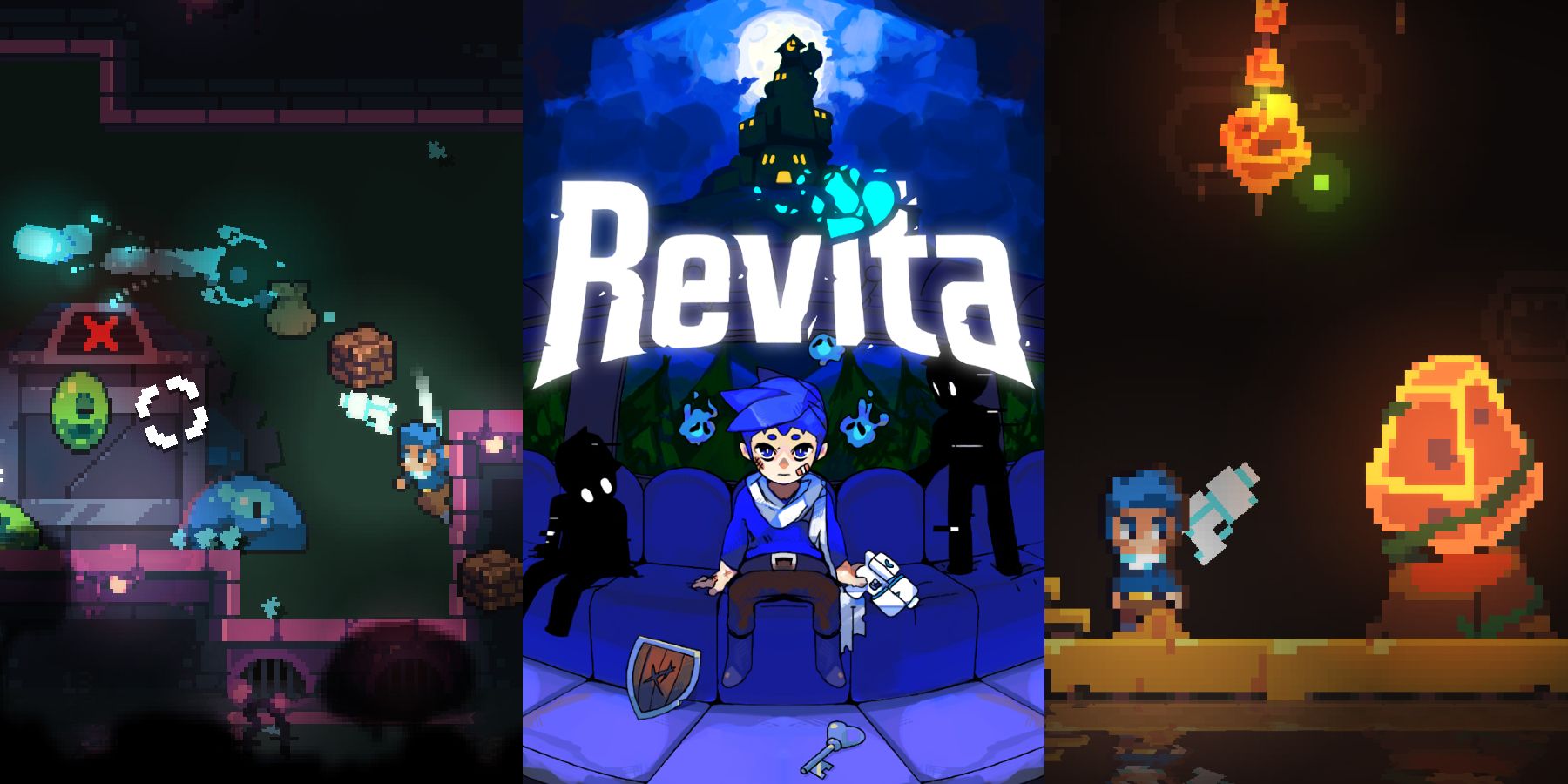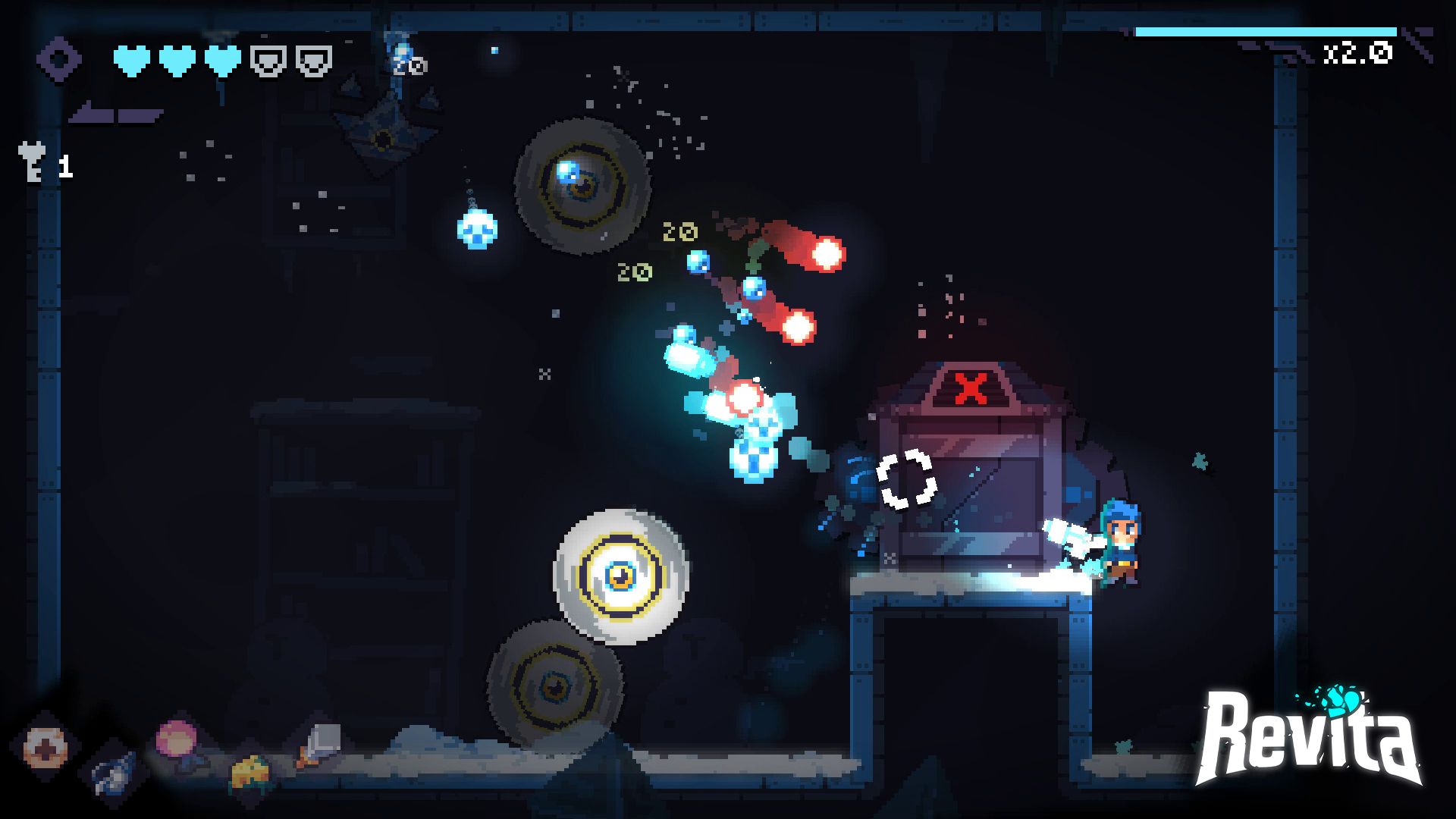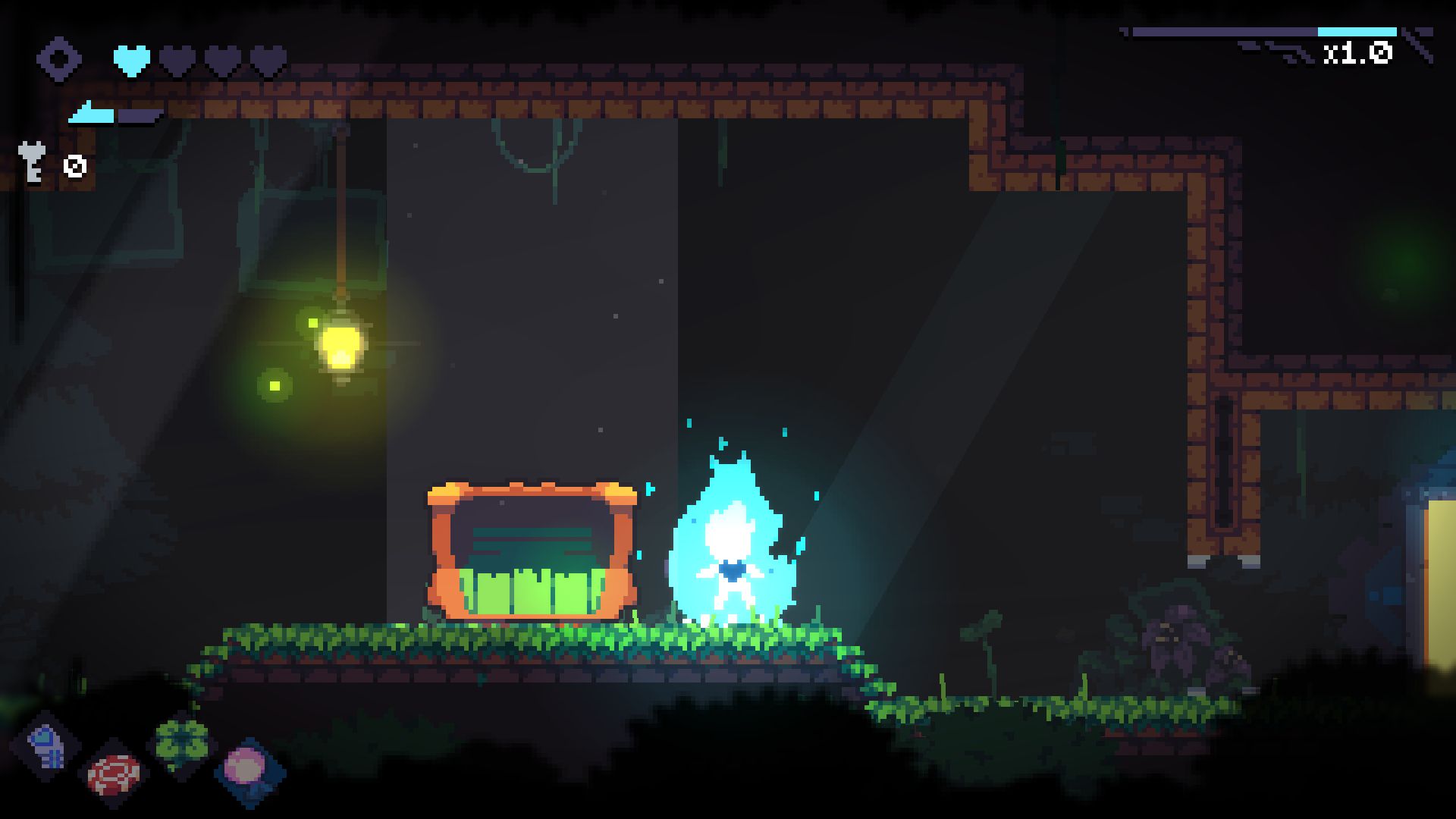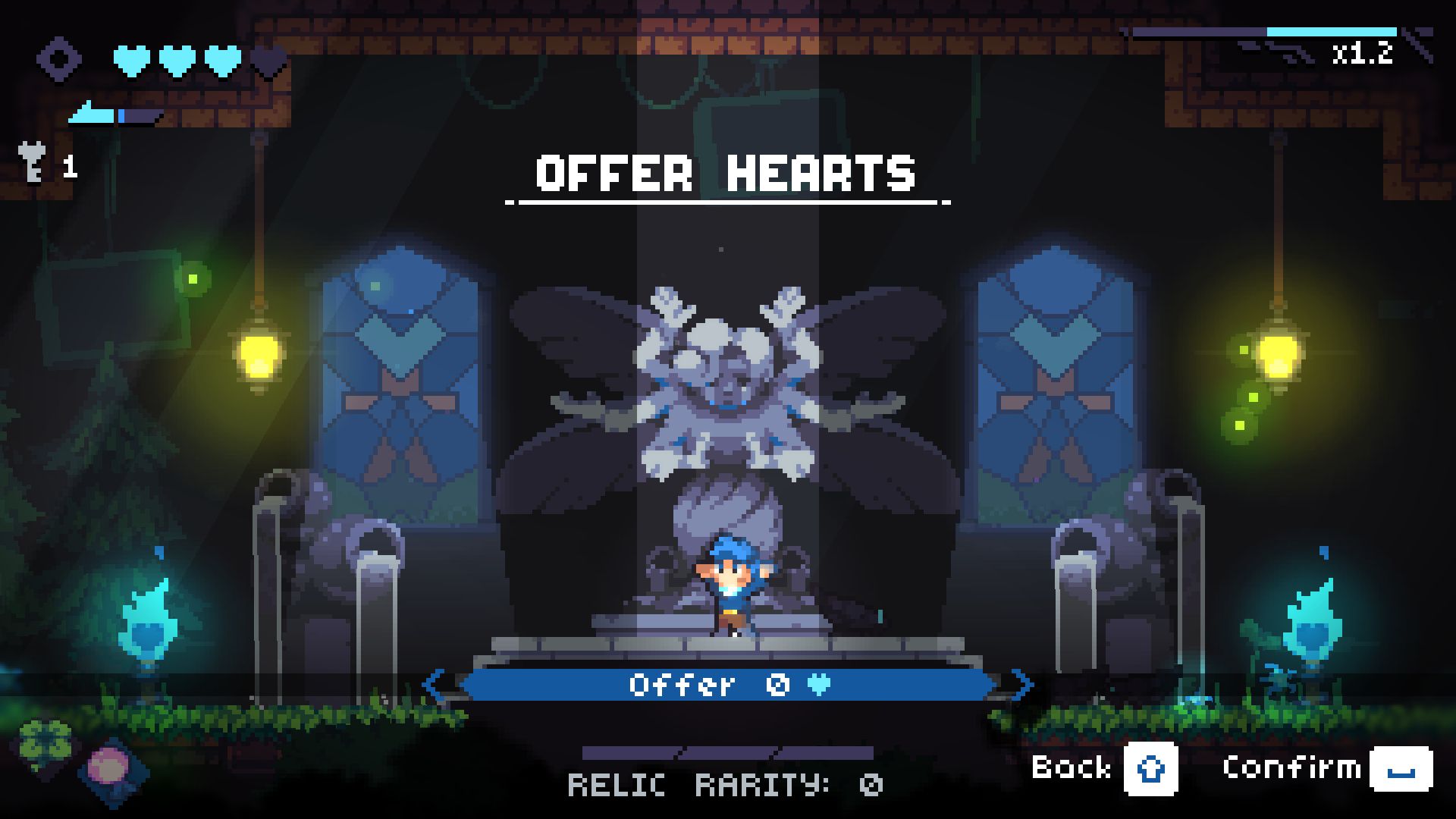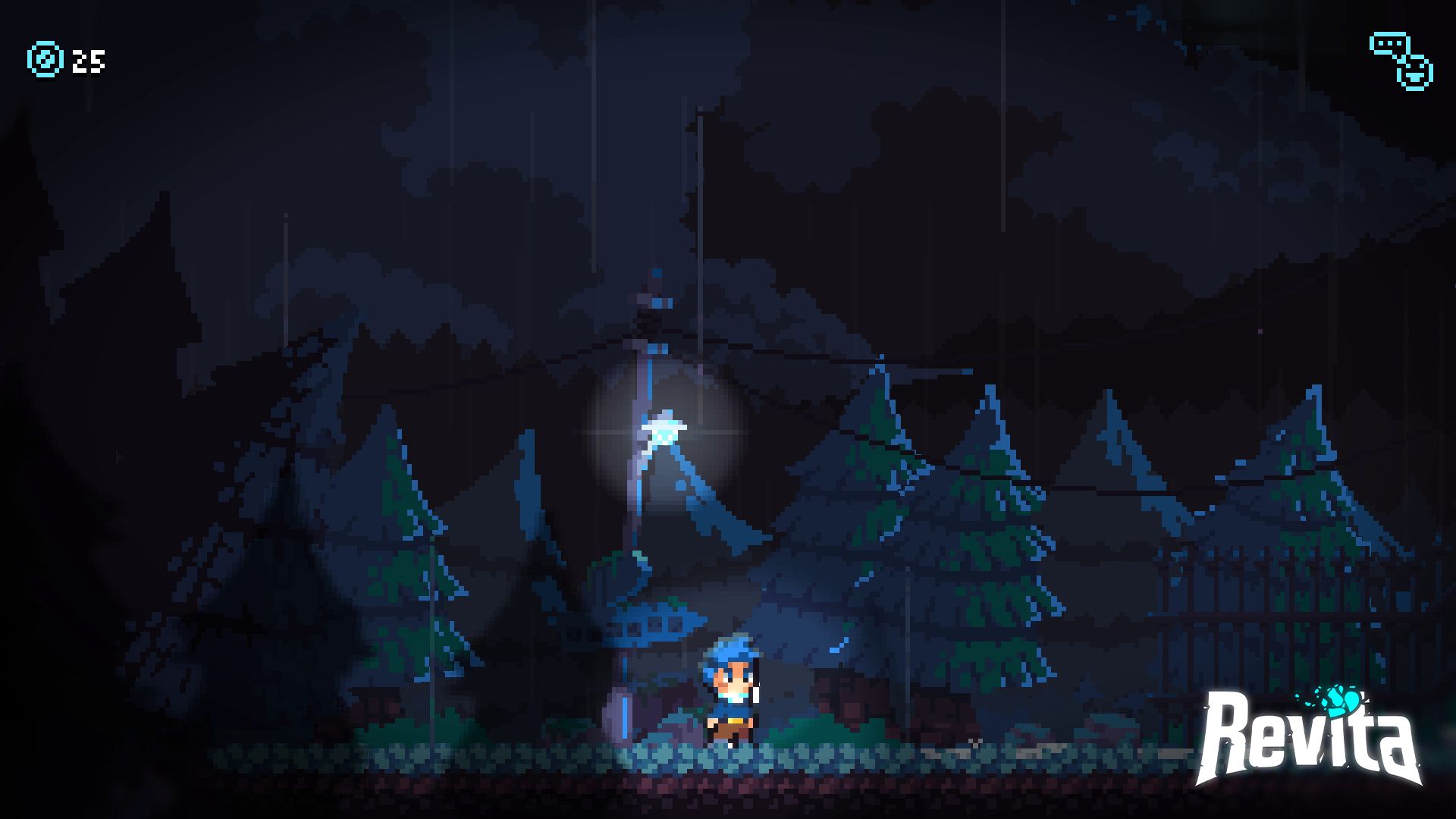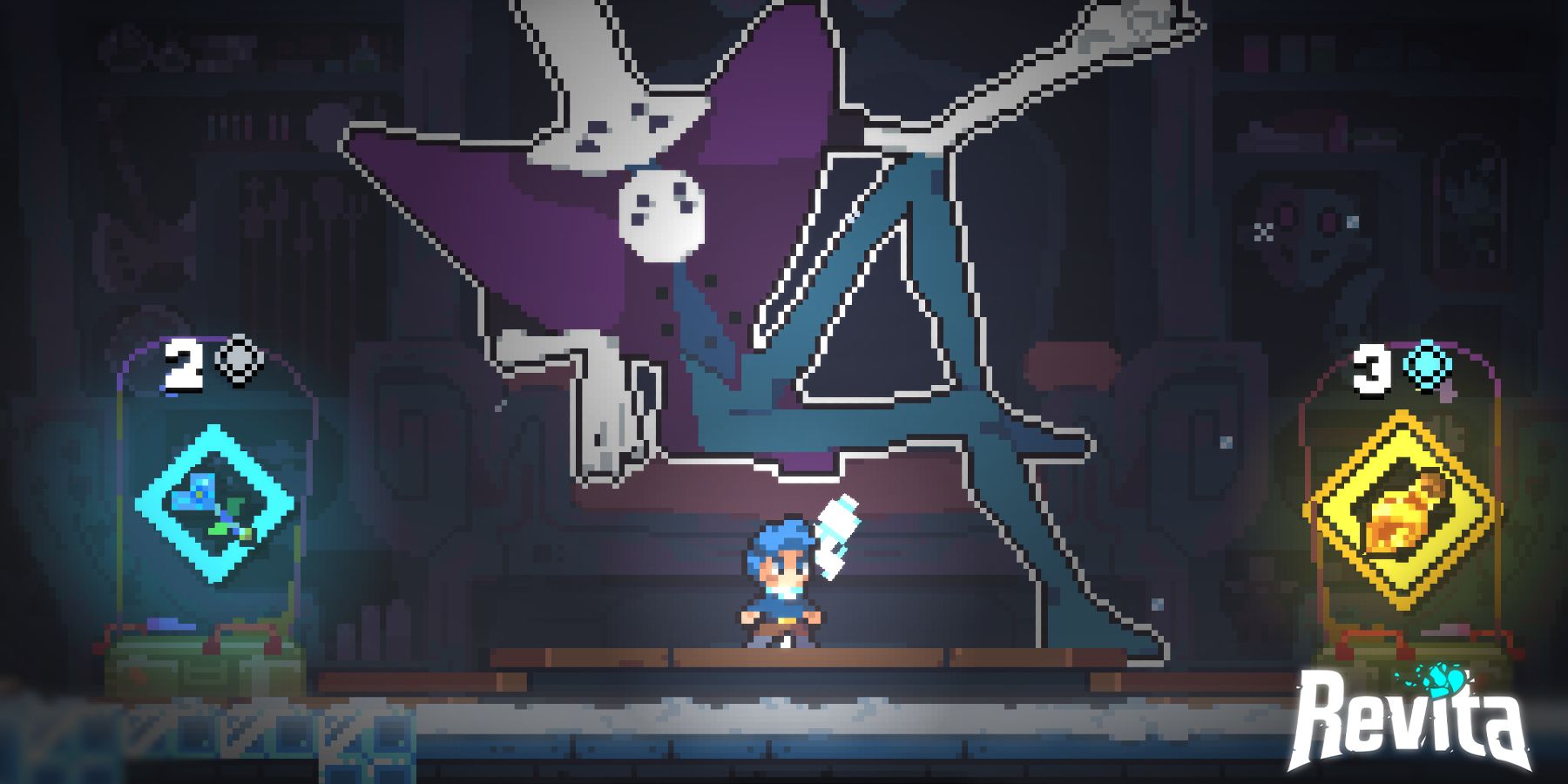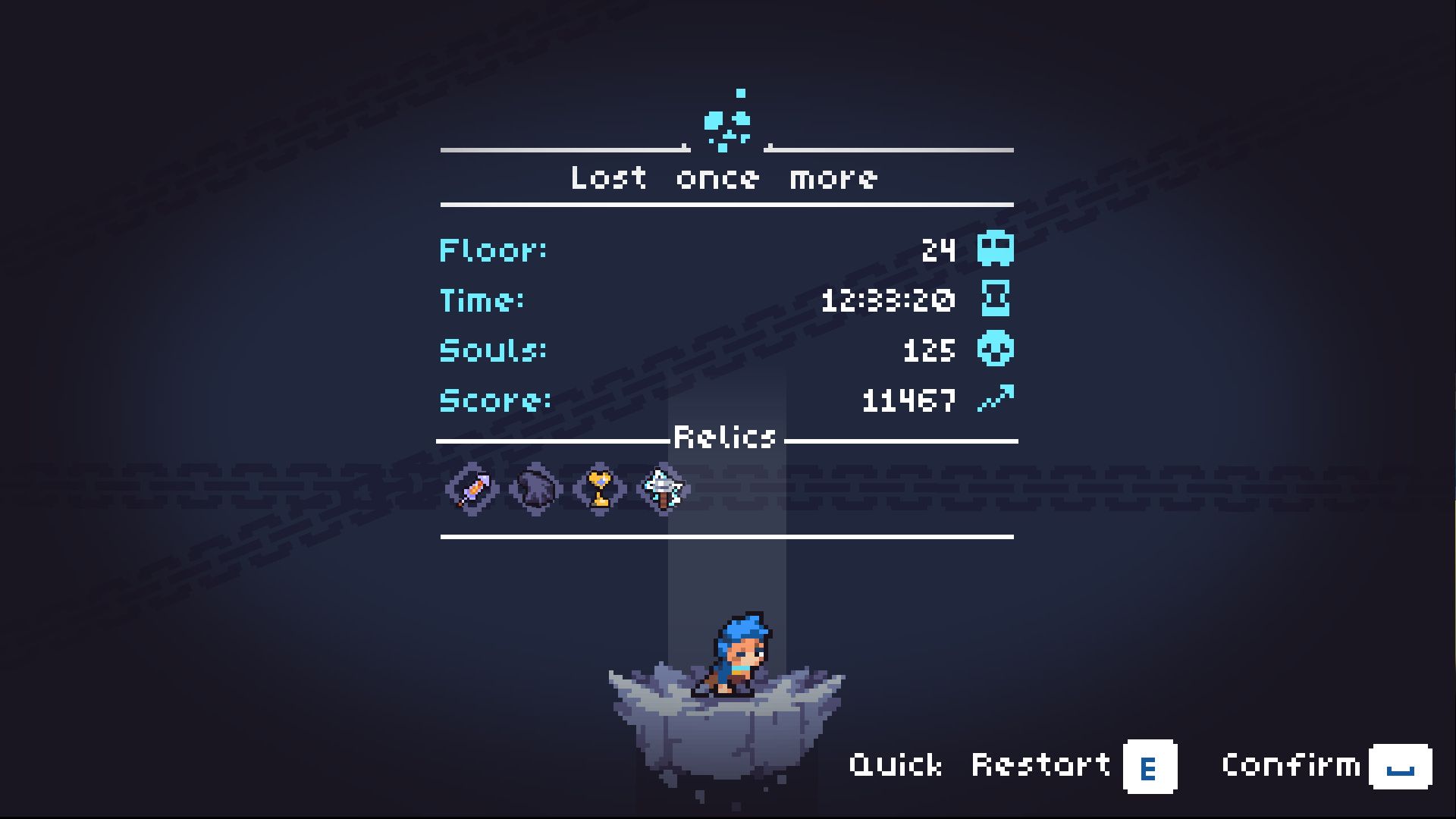It may be hard for casual fans to tell the difference between roguelike and roguelite games, the latter typically emphasizing a stronger sense of progression as players carry things forward to make future runs easier. Regardless of where any individual title falls on the spectrum, this overarching style has become increasingly popular, as evidenced by recent successes like Supergiant Games' Hades and Housemarque's Returnal. Revita aims to leave its mark on the roguelite scene by using a health resource-management system to dial up the game's risk.
Game Rant spoke to lead developer Benjamin "BenStar" Kiefer about the winding path of Revita's development over the last half-decade, and how a now-small team is preparing to launch on PC and Switch come April 21. Interview has been edited for clarity and brevity.
Q: What's your elevator pitch for people who have never heard about Revita?
A: Revita is a fast-paced roguelite with a very, very strong emphasis on risk-reward systems, where basically every decision you make will have some long-term consequence. The main point of the game is that your main currency, the thing you purchase anything with — be it upgrades, additional damage increases, etc. — is all done with your health. That means every decision regarding items has heavy consequences, as it also means you're closer to death.
That has some other implications so far as "how do I strategize in a run," "am I willing to take this item," "am I willing to put myself in this risky position where the run could be over at any second?"
Q: Where did that idea originate? I know we've talked about influences like Binding of Isaac, Hollow Knight.
A: I think the whole idea of using HP as the main mechanic originated from when I was playing The Binding of Isaac. In Isaac there's something called "Devil Deals," which basically means if you do well in an area you have the chance to convert some HP into items and upgrades. I thought, wait, this is a really cool idea, but what if it was possible to construct an entire game around that concept?
Roguelites in general are very much about risk-reward. They have short runs with the idea of everything being challenging, and every hit has consequences. So what if I just take this and really heavily emphasize that point to construct every mechanic in a game? It creates, in my opinion, a very interesting gameplay loop.
Q: How did the reality of development on Revita differ from your expectations based on looking at pre-existing games?
A: Actually since Revita is more-or-less my first proper, big-scale project, it started out as a very different game. Originally it was similar — you were a child, basically, trying to climb a tower. But back then you had a bow and arrow; guns and the HP mechanic came later. I liked the basis of it, but wondered whether I could do something more. There were multiple iterations, one where you had a sword, and later the gun we have now. The HP mechanic came in when I felt I knew how to make a basic roguelite, so I had to take it and make something really unique and fun.
Like I said earlier, I really like the idea of figuring out how to emphasize risk-reward mechanics and bring them to their full potential.
Q: You've talked about the game being with you over many phases in your life, can you elaborate on that?
A: I originally started working on Revita — which back then was called Arrow Dynamic — toward the end of high school. Roughly six, seven years ago. That's when the idea started, and it was basically my foray into game design, which I thought was really interesting; something I was very invested in.
I was working on the idea for a while, but as it is when you're new to any kind of creative endeavor, it's hard to keep to one idea. I wasn't happy with what I had anymore, so I scrapped it and introduced new mechanics. In that case I wanted to try a sword, because close combat is fun and interesting. Then when that didn't work I had to really think about what I wanted to emphasize. That's when it became what it is today, Revita.
Q: How did you land on your gun mechanic specifically?
A: Originally it was a bow and arrow because I thought it was really interesting, not just a straight bullet. Its arc was curved, you had to think about that. But then when I was working on the base for what Revita is now, I was reconsidering things. Swords didn't work because I wanted to give the character a weapon with a lot of versatility. You can do a ton of stuff with projectile weapons that you can't really do with a sword, or if you do, it's a lot more work-intensive. There's a lot more set-up to everything.
In the end I thought guns are really satisfying to use, and with that shift in focus came a shift to not thinking about aiming at enemies. I wanted to simplify the main combat aspect and create, essentially, a resource-management game. The combat adds onto that mechanic. Too much of a focus on aiming would probably have been a bit too overwhelming, too complex. It's like okay I don't just have to look at HP, look at not getting hit, I also have to angle this bow to hit enemies.
Q: Speaking of versatility, as you approach your 1.0 release and talk about its insane scope on Twitter, how big has that scope become?
A: So funnily enough, or probably not-so funny to other people on the project, I have a big issue with overscoping. I'm getting better at it to be fair, to some degree at least. With Revita the idea became each update needs to one-up the last update, which was moreso accidental. It just happened because people kept saying, "This update has these cool things, what will the next one have?" Then me being me, I'd say what cool stuff can I add to make things more exciting?
That has resulted in this 1.0 update, which happened to take on the scale of every previous update combined. Whoopsie. It wasn't supposed to be this way, originally the 1.0 update was supposed to be smaller than the last, which added a lot of story elements. This was supposed to be rounding out the game with final polish, the last touch of content. It ended up becoming a lot, lot bigger than that.
Q: Do you have a final count on how many potential things that players can get?
A: The last update brought up the item count to I think 275, and we're now way above the 320 line. It's massively scaling out of scope, but I think what we have is pretty cool.
Q: Thinking about people's reactions to Revita, did going into Early Access last year shift the way you approached the game?
A: Definitely. When the game originally released into Early Access it had a lot of problems that I didn't even consider problems when we started. For example, one of the main ways to get items is statues in each area. You can choose how many hearts you want to spend on those, and then you get an item in exchange. Originally you didn't know what you'd get, you just put in whatever amount of HP and assume the more you spend, the higher the chance of getting a good item. It's true, but had the consequence that a lot of people didn't like the mechanic; if you got something bad after spending a lot of HP, it felt bad. People started to not spend as much because they could also get good items using one HP.
So with the first update we completely overhauled that. Now it's akin to a drafting system where you can see what items you get, that way you know the risk of going into something. It's a lot more interesting and malleable gameplay interactions, because then even people who otherwise wouldn't spend a lot of HP see that good Relic and think "maybe I'll try that."
Q: Once you hit 1.0, are there plans to keep updating and implementing feedback? Or are you cutting yourself off?
A: In that regard, I'm someone who always comes up with new ideas for stuff, so I do have a list of cool things to add at some point in the future. But sadly, as with a lot of this stuff, the financial aspect comes into play. Even if I would like to, I can't keep working on a project forever. If it were to do really well, there are things I think would be cool. One big example that keeps coming up in the community, for good reason, is that Revita would be a good candidate for modding support. That would be neat, but it's also a big financial investment.
Obviously we'll be doing bug fixing and that kind of stuff, but when it comes to new features, that's very much dependent on the financial viability.
Q: In terms of that financial viability, you recently announced a surprise Switch release. How did that happen? Was it difficult porting Revita?
A: The Switch was kind of always planned, from very early on. I'm a Nintendo fan, so it has always been a pipe dream for me to release something on a Nintendo console. When I approached Dear Villagers about it after we started working together, we decided Revita would be good for Switch because it has a Nintendo spirit, you could say. It feels like it fits in style, artistic vision, its pick-up-and-play focus.
Transitioning over was surprisingly not that difficult. We're using GameMaker Studio for the development of Revita, and it's easy to port to Switch based on my experience so far. The main blocker was optimization. With the kind of game Revita is, you quickly get into situations where there are tons of bullets on screen interacting with tons of items. You have to make sure the Switch doesn't explode from that, but we're at a point where it runs smoothly, and I'm excited about it.
Q: Money permitting, are you interested in seeing Revita come to other platforms?
A: My personal preference is obviously that I'd like as many people to play the game as possible, but apart from that I can't say much more.
Q: Hitting the end of this six, seven years, are you looking forward to having more time to rest and play games like Kirby and the Forgotten Land?
A: For sure. I'm a very work-heavy person, and I can't really stop myself from working, but it is going to be nice to not have to hit the Early Access cycle of expectancy. That feeling where it's been X amount of time since the last update, there needs to be a new one now. It kind of naturally comes from the community, because you paid for something in-progress and want to see it evolve. But once you hit 1.0, you've paid for what's there: the "final" product. It lifts the expectation and makes it easier to allow myself to take breaks, to play the new Kirby game. There's no pressure to get more stuff out.
Q: Well 2022 is a huge year for video game releases in general. Are you excited to see Revita alongside anything else on the market?
A: I'm very much looking forward to the new Xenoblade game as a huge fan of that franchise and how interestingly designed its worlds are. Then there's the new Pokemon games that got announced — so many games this year.
Q: How would you say the overall reception to Revita has been toward the end?
A: Especially lately, the reception has been incredibly positive, which is really nice to see as someone who suffers from imposter syndrome. When you see people talk negatively about a thing you worked on, it makes you think you're a bad developer, you know? But recently with all the feedback we've received, be it through our Discord community or Steam reviews, it makes me excited to get to see people play 1.0 and look forward to the future.
Q: Is there any content in the final release you're especially excited to have people see? New Relics, costumes, etc.?
A: I think funnily enough, the thing I'm mostly looking forward to people experiencing is the quality-of-life stuff in 1.0. For example, now there's a map you can look at to see where you are on your journey through the tower. It makes the experience feel more like a finished, polished game.
There is a lot of cool, interesting content though, which I cannot - and do not - want to talk about much. I'd like to keep it under wraps.
Q: How important to your process has it been to gather a fan community on places like Discord?
A: I'd say very. It wasn't something that intentionally happened, I started my game dev journey just sharing GIFs of my process on Twitter — not just for Revita, also other prototypes. Through that I built up a following, and later on I started sharing things about Revita through Discord. To me, community building is more and more important nowadays.
We want feedback and support from the community because the goal at the end of the day, for me at least, is to make this game as good as I possibly can. While I am the designer, I don't know how everyone will experience the game. For example, one major change in the last big update was we changed enemy damage. Instead of all enemies dealing one heart, they deal a half-heart of damage, which changes the gameplay up completely. But it leads to the game being a lot more approachable, and a lot of that was because of people on places like Steam saying "I really like a lot of the elements in this game, but the economy feels really punishing and frustrating." If that hadn't been here, I might not have changed it.
Q: On a different side, we met through IndieLand. I also understand you're going to WASD. How important has it been to build up a community with other game devs?
A: I'd say also very important. With that kind of stuff I'm a person who is very interested in other people and what they're working on, I'm magically drawn to that. For example, with IndieLand I learned about it through other developer friends of mine. That's usually how it happens to me, I'm very interested in something and just say, "Hey, this looks really cool, let's talk about it." Then friendships develop, and it leads to new opportunities.
Q: Are there any other events or activities you're planning to attend?
A: It's a little tricky at the moment. Events are starting back up again with COVID — hopefully — coming toward the end, we'll see. While there's nothing in particular I'm looking forward to, other than IndieLand which I'd very much like to participate in again. Apart from that, I don't even know what events are going on this year, so we'll wait and see.
Q: Did you find your work ethic change when COVID hit?
A: For me personally, not really. I work from home so I wasn't super impacted by it. Obviously, you're impacted by a certain mental pressure due to COVID, you constantly keep reading about it on the Internet — especially when you're social media active. So it has a mental health impact.
In terms of Revita specifically, pretty much the entire public development cycle for Revita has gone on with no events. WASD is the first time Revita will be at a live event. That comes with drawbacks, because it's a good source for mobility, community engagement, that kind of stuff. It's definitely something I'm sad about, but it is what it is. With events starting up again, hopefully we'll get to be at a few.
Q: I know there are others like Schipp helping out. How many people are working on Revita?
A: Aside from the obvious one, the publisher, we are currently a six-person team if I'm calculating correctly. We have a composer/sound designer; a writer who does most of the character dialogue, enemy descriptions, etc.; a community manager who handles social media and community events; and as you brought up Schipp, who is the lead artist doing a lot of the environments and design aspects. Then we also have Tom, an additional animator who helps with enemies and bosses. He's worked a lot on the upcoming update.
Q: How important has it been to have that help?
A: It's quite surprising going from a completely solo developer to working in a fairly sizable team. I went into this with the mindset that I need to have control over every aspect of development, this is my child. But then getting people on board to help is incredibly helpful, because no; I can't do everything. The scope of the project is way too big to do everything on my own.
Also, having multiple people on the project gives you different insights, different opinions. It's super helpful in making an interesting and diverse project.
Q: Knowing Schipp is working on a grad project, are you involved in any way? Doing something to help give back
A: I'm not really involved in that at all. We're talking about it from time-to-time obviously, because we're friends. I give my opinions on stuff. But what Schipp is putting together with that project is really cool. Like I said earlier, for me, it's just exciting to see people on their game development journey, figuring out their own project. It makes me giddy to see that kind of stuff, I want to know more.
Q: One of my favorite things about item-heavy roguelites is seeing references to other games. What is it like designing those homages? Are there a lot in 1.0?
A: Yes, there are quite a few more coming in the next update. Specifically, one of the mechanics is you can unlock and wear different hats, so it has been a focus that I know a lot of developers and games I want to reference. But with regard to Relics, a lot of that comes from me being like, "Oh I really like this game." I want to pay tribute to how it influenced me. For example, as you brought up the Hollow Knight cape. Hollow Knight is probably my biggest inspiration in general when it comes to game development. What they achieved is just incredible.
One of the new items in 1.0, that I won't talk about specifically, is a reference to Mario. Then there are other references, sometimes to roguelikes, sometimes to games in general. Even to other media. I like doing references, I think it's really fun especially when people figure out ones that are more obscure. In these kinds of projects, I want to pay tribute to the media that informed my approach to development.
Q: If it's something you can or want to talk about, are there other games with plans to reference Revita in the same way?
A: There have been a few games that directly reference Revita. One of them is One Step From Eden. There's an item in that game that's a very direct reference to the gun in Revita, like a familiar, which I think is quite funny. There's another in The Void Rains Upon Her Heart, I think the item is just called Revita Heart. Probably a few more I can't think of off the top of my head, but that stuff is always heartwarming.
As a side note, when One Step From Eden came out, I knew about the reference beforehand because I'd been talking with the developer, so I was watching a lot of streams just hoping it would show up. Like heck yeah, that's referencing something I made. It's really cool.
Q: You said you plan a lot of over-ambitious things, so with Revita potentially coming to an end, are there other ideas you're toying with?
A: For sure. Right now I'm very much focused on Revita, all other ideas I come up with aren't fleshed out. I just write them up in a document. But there are pipe dreams, like working on a Paper Mario-inspired RPG. I think pretty much every developer has that pipe dream, but RPGs are just such a monolithic undertaking. Like that would be cool, but do I really want to work on this project for 10 years? You need financing, a big team... I'm not in a place where I think I want to do that now.
But there are certainly a few ideas floating around in my brain, things I think would be neat. I'm just focused on Revita though, planning potential stuff there that I can't really talk about. Who knows what the future holds.
[END]
Revita is available now in Early Access, and releases April 21 for PC and Switch.

